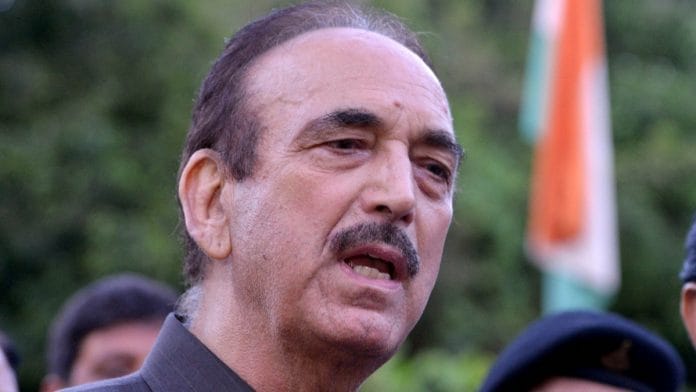
Thank you dear subscribers, we are overwhelmed with your response.
Your Turn is a unique section from ThePrint featuring points of view from its subscribers. If you are a subscriber, have a point of view, please send it to us. If not, do subscribe here: https://theprint.in/
After a sceptical stance within the G23 coterie of Congress party, the epiphany finally struck Azad that the endeavour to ameliorate the grand old party is a pipe dream. Such was the intensity of this realisation that he seemed out of options except to quit. It was not just this benign exit that raised eyebrows, what was more intriguing was the terse references and opprobrium against the Gandhi scion. To locate the timing of such an incident is itself worth looking into, but that is a separate subject to deal with. Now, interestingly Azad has set his sight on the upcoming assembly elections in Jammu and Kashmir. Azad is soon to launch his political outfit (Democratic Azad Party) and such a veteran cannot throw his weight around except for careful considerations. The Congress Party seems to be the only one among the dramatis personae to suffer a blow to its political prospects in the erstwhile state while the BJP is vying to become the prima donna of the political drama unfolding in the Union Territory.
The situation is opportune for every political party to proselytise their agenda towards achieving their ends but what would the ending entail when the whole means to achieve it was based on sleight of hand manoeuvres to undermine public trust and confidence. The PAGD (People’s Alliance for Gupkar Declaration) albeit stands on a common ground; we cannot totally neglect the realpolitik that holds sway over modern politics; particularly when it comes to J&K. The fissures are apparent in such a motley of grouping where major ideological differences often preponderate and outweigh the real issue that is to be tackled and resolved in tandem. But what about the common populace.What about the profanum vulgus that seem to play no role except as mute spectators?
Such divisions and factionalism serves no fundamental sense and substance to the general public that seem to grow disgruntled with each passing day.For political parties who are in fray, to proceed with pragmatism sans the historical accounts would be to end in a cul-de-sac.
Political culture is in disarray, economic culture is stymied and social culture reeks of rumours, apprehensions and speculations,not to talk about the psychological stance of the common populace. The valley has been quite placid post abrogation of the Article 370 but we should not affirm by this description that spate and cycle of violence has ended for good. Far from it, to make such a statement would be overtly dogmatic and deceptive. The concept of Power Law by American Political Scientist Bear Braumoeller which expounds that the brief interlude of peace and calm after any conflict or violence may turn into rabid and dangerous mutations that would be pernicious and risks to upend the edifice of any community. Such a foreboding behoves the state actors to play a responsible role in charting a trajectory that would not hamper the public unity but instead augments it.
With all the permutations and combinations yet open dovetailing with the modus operandi of all political parties to pursue the power echelons, something essential is being obliterated:The Existence of Public Zeitgeist. The public is sensing a fear of losing what was never theirs; partaking in decision making. What would remain in democracy if you were to take this one precept out of it. It would be equivalent to Elitism and Statism. For the sake of the good of everyone, let all the stakeholders embrace Burke’s Active Virtue and tread the waters cautiously and hold a parley to unearth a silver bullet to overcome this quandary, albeit in sanguine. Only time will tell what will ensue and justly history will vindicate if that outcome served its cause.
These pieces are being published as they have been received – they have not been edited/fact-checked by ThePrint.


COMMENTS